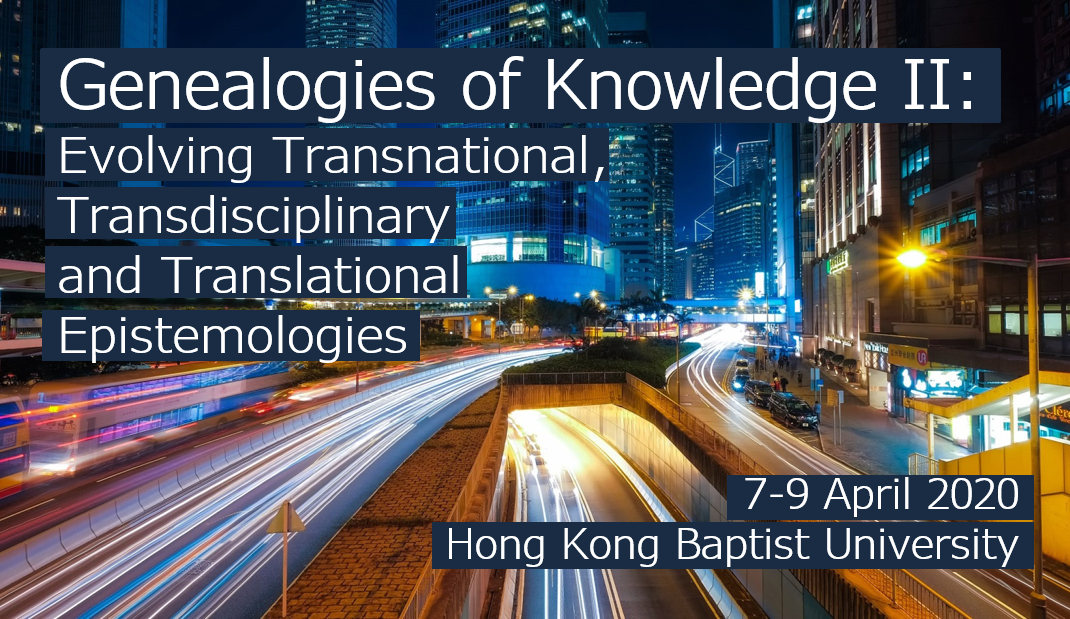An international conference hosted by the
Centre for Translation and the Department of Translation, Interpreting and Intercultural Studies,
Hong Kong Baptist University, Hong Kong
In collaboration with the
Genealogies of Knowledge Project, University of Manchester, UK
7-9 April 2020
CONFERENCE THEME KEYNOTE SPEAKERS
VENUE IMPORTANT DATES OPEN PANELS
Translating Modernity: The Dissemination and Mediation of Modern Concepts in Asia
Convenors: Yifan Zhu and Kyung Hye Kim, Shanghai Jiao Tong University, China
Modernity, the ensemble of socio-cultural concepts that include science, rationality, liberty, the individual, rights and democracy, arose initially in Europe in the seventeenth and eighteenth centuries, and was introduced to Asia between the latter half of the nineteenth century and the early twentieth century. Core ideas of modernity were introduced through translations of literature, philosophy, politics and economics alongside technological and scientific works at critical moments, including the Meiji era in Japan (1868–1912), the Modern Enlightenment era in Korea (1880-1910) and the May Fourth movement in China (1919). Translations of a wide range of texts featuring central concepts and manifesting knowledge of modernity were often carried out as part of a country’s attempt to establish itself as a modernized nation. Such products and practices of translation have had a huge impact on Asian society: on the one hand, imported Anglophone and European thinking and knowledge have reshaped and reconstructed Asian philosophy, science and politics (Lackner et al. 2005; Levy 2006; Kang 2017); on the other hand, more importantly, these modern concepts, steeped in Anglo-European traditions, were inevitably the subject of much negotiation and mediation as they travelled across space and time (Liu 1995; Zhu and Kim 2017).
This panel aims to explore the role of translation as an active and agentic site of manifested negotiation of historical and social relationships, where ‘western’ (specifically Anglophone and European) concepts associated with modernity, dramatic social changes in Asian countries, and Asian socio-cultural traditions interacted and ultimately shaped the discursive construct of the ‘Asian Modern’.
Potential questions of interest include but are not restricted to the following:
- How have key western concepts relating to modernity, such as republic, economics and science, been negotiated and transformed as they travelled to Asia through translation?
- How have key western cultural and economic concepts, such as civilization and capitalism, been negotiated and contested in translations into Asian languages?
- How has modern western knowledge in areas such as science and technology been introduced and negotiated in translations into Asian languages?
- How have translations of western concepts contributed to Asia’s engagement with modernity in the late nineteenth and early twentieth century?
- To what extent has Asian modernity transformed and hybridized western modernity?
- To what extent has Asian modernity – as expressed through concepts relating to science, liberty, and citizenship, for example, and redefined in Asian contexts – offered a different version of modernity to challenge the former centres of power?
References
Kang, J. (2017) ‘Rethinking Korean Translation of “Western” Medical Knowledge in the Late 19th and Early 20th Century’. Paper presented at the Genealogies of Knowledge Conference, The University of Manchester, UK, 8 December 2017.
Lackner, M., I. Amelung and J. Kurtz (2005) New Terms for New Ideas: Western knowledge and lexical change in Late Imperial China, Amsterdam: Brill.
Levy, I. (2006) Sirens of the Western Shore: The westernesque femme fatale, translation, and vernacular style in modern Japanese literature, New York: Columbia University Press.
Liu, L. (1995) Translingual Practice: Literature, national culture, and translated modernity —China, 1900-1937, Stanford: Stanford University Press.
Zhu, Y. and K. Kim (in press) ‘Individualism on the Move: Redefining “individualism” in China’, Translation and Interpreting Studies.
Panel Convenors
Panel presentations
- Women’s Rights and Confucian Morals: Lin Shu’s translation of images of modern western women, Jing Shui
- Constructing the Nation-State: A Corpus-based Investigation of Adapting Western Ideas in Late Qing China, Qing Cao
- The Translation and Dissemination of Western Drama in Early Twentieth Century China, Tingting Xiong
- Translating Modernity: Negotiating the Role of American Female Missionaries in Chinese Society, Yingjie Zhang
- ‘Rights’ Redefined in China, Yifan Zhu and Kyung Hye Kim

